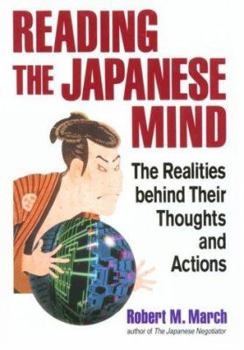Reading the Japanese Mind: The Realities Behind Their Thoughts and Actions
The author of "The Japanese Negotiator" and "Working for a Japanese Company" reveals the inner culture of Japan, highlighting modes of thinking and communication, the central role of social status,... This description may be from another edition of this product.
Format:Hardcover
Language:English
ISBN:4770020449
ISBN13:9784770020444
Release Date:January 1
Publisher:Kodansha
Length:209 Pages
Weight:1.00 lbs.
Dimensions:0.9" x 5.8" x 8.6"
Customer Reviews
3 ratings
An important aid to better understanding.
Published by Thriftbooks.com User , 17 years ago
March's book is a cross section of Japanese people and society, (how people live, think, work and what they value). The books central idea is to provide an insiders guide for non-Japanese that covers a wide variety of topics useful for daily communication and contact. An important aid to better understanding. The author assumes the reader has no knowledge of Japanese culture and explains in detail topics of importance, for example, gift giving, non verbal communication and what it means to be Japanese. The book will be of particular use to language students, business people, academics and travelers who plan to spend time in Japan. His suggestion of how to best adjust in Japan for foreigners, (learn the language and follow protocol) is sure to be of wide interest. March's research draws on a wide range of sources and the book's bibliography provides a wide range of references for those who want to explore further reading on the topic. The impression the book left on me was March's intimate knowledge of the culture and the people. Highlights include his analogy of "living in a box", "ways other than logic" and his detailed investigation and explanation of body use. I found the book informative and balanced in its approach. For those who have already been to Japan you are to sure to find many new insights in this book. Peter Hanami, July 2007
Never offend!
Published by Thriftbooks.com User , 19 years ago
Yes, yes, yes - I kept saying when I was reading this book. Seventy-five percent of the international students who had lived with me were Japanese. One of them sent me this book and I thank her forever for an extremely valuable gift. Until then I thought I knew about Japanese culture and habits, but this book was a true eye-opener. The examples were my students. The behaviors were those of my students. The attitudes were displayed by my students. I would like to give just one example. Before reading this book I took it for granted that when I gave directions and asked "did you understand everything?" and a "yes" accompanied by a nod of the head was the reply, my students would know how to get some place and back. But oftentimes that didn't happen, and they were lost for hours, much to my frustration. The need to please did not allow them to tell me they hadn't understood. After reading the book, I no longer asked. I had them repeat the directions and write them down. They no longer got lost. This book helped me to better understand and deal with my Japanese students. The knowledge allowed for better communication, assisting them with their culture shock experiences, their homesickness, their unique approach to family, friends, and community. Anyone considering travel and/or work in Japan or hosting Japanese students in their homes should read this book.
A good survey of the Japanese sensibility
Published by Thriftbooks.com User , 25 years ago
Popular media, stereotypes, etc. have made great strides in misinforming the West about Japan. Japan is much more complex than sushi, martial arts, and electronics; and the people are more realistic than kamikaze businessmen and geisha girls. The Japanese have a very highly evolved social structure, and anyone who is interested in dealing with or studying Japan should read books like this one. Dr. March explains the Japanese pysche in a way that Westerners can understand. He doesn't dramatize their thinking as a sort of sage wisdom, nor does he go out of his way to discredit the Japanese. There are a few instances, however, in which March places too much emphasis on his personal experiences when drawing conclusions about the Japanese. It cannot be stressed enough that although Japan is a group-oriented society, the people are still individuals. One or two experiences certainly cannot be taken as a definition of the culture. One must also understand that Japan is changing rapidly. Even the concept of being Japanese is not the same as it was a few decades ago. Conservative people will always be around, but they do not necessarily represent today's Japan. All in all though, Reading the Japanese Mind is a good guide to the Japanese mindset.






